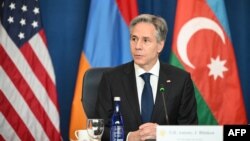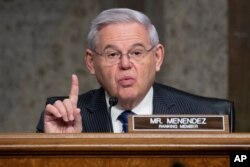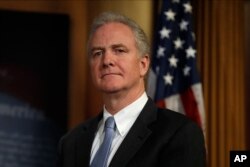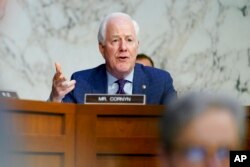Republican and Democrat senators are backing Secretary of State Antony Blinken's trip to China beginning Friday but remain skeptical that it will lead to a breakthrough in relations with Beijing.
Blinken is expected to emphasize the importance of maintaining open lines of communication between the two countries and discussing regional security issues, climate change and the global economy. State Department officials also said the issue of illegal fentanyl trafficking to the United States would also be a prominent part of the talks.
Ahead of the trip, VOA's China branch spoke with several U.S. senators about their expectations for the talks, including whether Blinken should raise the issue of a Chinese spy station in Cuba, which was confirmed in recent days by U.S. officials.
The interviews have been edited for brevity and clarity.
VOA: Do you think China's spy base in Cuba reflects the scale of China's infiltration or influence in the region?
Senator Bob Menendez (Democrat): I'm looking forward to a briefing on China's spy station inside of Cuba. Obviously, it now seems that it is not something new, according to published reports. But the mere fact that certainly we didn't know about it is really alarming to me. And what's also alarming is that 90 miles [144 kilometers] away from the United States, you have a great opportunity to do significant signal and other intelligence over the United States. I think that any country who wants to allow China to do that from their home base must understand that the United States not only looks at it as a real challenge and problem, but that there must be consequences that flow from it.
VOA: How would you like Secretary Blinken to address this issue?
Menendez: I hope that he will raise it. You know, I don't want this issue to impede his ability to have his trip and have face-to-face and tough conversations with the Chinese leadership. But I do think you should make it clear that we look at it as an affront, in terms of our own security and sovereignty.
Senator Todd Young (Republican): I want to make sure it is a topic of conversation. But beyond that, just emphasize that the American people will be insisting that their government does whatever it can to prevent invasive and unwelcome surveillance activities against the United States. Period. But most certainly those that emanate from our hemisphere, that should be conveyed in an especially powerful way in the wake of the balloon incident that occurred just weeks ago.
VOA: Do you believe China has been taking steps for a meaningful dialogue with the U.S.?
Senator Chris Van Hollen (Democrat): Well, they have not engaged in our effort to try to establish a line of communication between our secretary of defense and their minister of defense, which is important to try to prevent accidents or unintended events from spiraling out of control. So, I hope during Secretary Blinken's visit, we can also resolve them.
Senator Tim Kaine (Democrat): Here's what I believe: Dialogue guarantees nothing, but the absence of dialogue almost always guarantees problems. So, dialogue has no downside and all upsides. And so, we have to keep making the case. And I'm hoping that China will also view dialogue is really important to promote stability to avoid miscalculation, miscommunication.
Senator John Cornyn (Republican): It seems like it's a one-way street to many people from the Biden administration reaching out, only to be met with no response.
VOA: Is this the right time for the U.S. to talk with China?
Cornyn: Well, I think it's always good for two countries to talk so that they try to understand each other better, so there's not any mistakes that could lead to conflict.
VOA: Do you expect any positive results [from Blinken's visit]?
Cornyn: No.
Adrianna Zhang contributed to this report.









